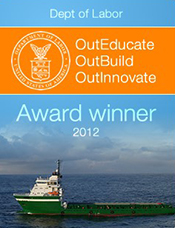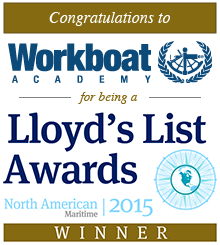Maritime Apprenticeship Programs
Ready to Start Your Maritime Career?
Are you interested in a career at sea—on ships on the Great Lakes, tugs in the Pacific Northwest and Alaska, or ferries on Puget Sound? The Maritime Apprenticeship Program (MAP) offers the fastest path to becoming a licensed deck officer, even with no prior maritime experience. In just over two years, you can be eligible for a U.S. Coast Guard Mate’s license.
Why Choose the MAP?
- Industry-Approved: Approved by the U.S. Coast Guard, State of Washington WTECB, Maryland MHEC, and by the Department of Veteran Affairs for eligible members and their dependents.
- Award-Winning: Recipient of the Department of Labor’s Registered Apprenticeship Innovator and Trailblazer Award and Lloyd’s List Training Award for North America.
- Hands-On Training: Alternate between classroom instruction and real-world experience aboard vessels.
Program Pathways
The MAP has three license pathways approved through the USCG:
- 500/1600ton Mate Ocean or Near-Coastal*
- National Mate Unlimited Great Lakes & Inland
- Third Mate Unlimited Oceans*
Each pathway caters to different areas of the maritime industry. Learn more about the pathways below. Please note, based on resources and available partnerships, not all pathways are always available. Programs MITAGS is currently recruiting for will be listed to the right under current offerings.
*Apprentices that undergo this pathway will also be eligible for the international qualifications of Officer in Charge of a Navigational Watch (OICNW)
Eligibility Requirements
To be eligible to apply for any of the apprenticeship pathways, you must:
- Be at least 19 years old (21 at program completion for officer endorsement).
- Have a high school diploma or GED.
- Be eligible for a U.S. passport – see U.S. regulation for maritime officers here
- Ability to enter Canada
- Ability to obtain:
- Pass a math entrance exam (85% minimum) – see below for more detail
Why a Math Entrance Exam?
Acceptance into the MITAGS apprenticeship program requires a math exam for several reasons:
Skill Requirement: Many apprenticeship programs, especially those in technical or trade fields, require a strong foundation in mathematics. Math skills are crucial for understanding navigation concepts, performing calculations, and problem-solving in real-world scenarios. Thus, the math exam serves as a preliminary assessment of an applicant’s mathematical proficiency.
Course Intensity: The apprenticeship program is intensive, hands-on training that covers a wide range of specific subjects in a relatively short period. A solid understanding of mathematics is essential for keeping pace with the curriculum and comprehending complex concepts. The math exam helps ensure that applicants have the necessary skills to succeed in the demanding coursework.
Predictive Value: Evidence from previous programs indicates a relationship between performance on the math exam and success in the apprenticeship program. Applicants who struggle with the math exam may also encounter difficulties in understanding course materials and completing classes.
Resource Allocation: Accepting applicants who lack sufficient math skills could lead to challenges for both the students and the program itself. Students who struggle with math often require additional support and resources that may not be available. By setting a minimum standard through the math exam, the program can ensure that resources are available and used effectively and efficiently to support all accepted students.
In summary, requiring a math exam for acceptance into the MITAGS apprenticeship program helps ensure that applicants have the necessary skills to succeed in the rigorous coursework. It serves as an initial mechanism to identify individuals who are better prepared to handle the technical demands of the program, ultimately benefiting both the students and the program as a whole. MITAGS and WSF aim to make sure that applicants are well-prepared to succeed in the apprenticeship program and the math exam helps in that process.
Wondering what math to expect? Click below to access a workbook to prepare for the math exam.
Your Journey
Apprentices work with partner companies*, gaining valuable sea service while reinforcing classroom learning. Upon completion, you’ll be eligible to take the U.S. Coast Guard exam to gain the credentials to sail as an officer on U.S. flagged vessels.
*Partner companies are companies that have signed agreements with MITAGS to follow the standards set by the USCG
Learn more below and take the first step toward your maritime career with the MAP.
Unsure if this is the right path for you, Click here to see an introduction into the various ways to get working on ships
Questions? Contact a School Advisor
Learn More In Our MAP Video!
Click below to view the MAP brochure.
Maritime Apprenticeship Programs Brochure
LEARN MORE ABOUT OUR APPRENTICESHIP PROGRAMS
WORKBOAT
Campus Location: MITAGS-West (Seattle, Washington)
Partner Company Providing Onboard Training: Currently particpating companies are Centerline Logistics, Foss Maritime and Western Towboat.
Program Start Date: March 2026
Application Dates:
- Application period: OPEN NOW
- Application period closes September 30, 2025
- License Pathway: Limited Tonnage Mate (500/1600 GRT)
Tuition Cost: $45,000 for 2025
- Total cost over two years split into 6 payments
- Does not include lodging
LEARN MORE
GRAND RIVER NAVIGATION
Campus Location: MITAGS-East (Linthicum Heights, Maryland)
Partner Company Providing Onboard Training: Grand River Navigation
UPDATED INFORMATION WILL BE AVAILABLE LATER THIS YEAR FOR THE 2026 PROGRAM – WATCH THIS SPACE
WASHINGTON STATE FERRIES
Campus Location: MITAGS-West (Seattle, Washington)
Partner Company Providing Onboard Training: Washington State Ferries
AT THIS POINT NO PROGRAM IS SCHEDULED FOR 2026.
UPDATED INFORMATION WILL BE AVAILABLE LATER THIS YEAR FOR THE 2027 PROGRAM – WATCH THIS SPACE
UNLIMITED TONNAGE THIRD MATE OCEANS
Campus Location: MITAGS-East (Linthicum Heights, MD) and MITAGS-West (Seattle, Washington)
Partner Company Providing Onboard Training: TBD
Program Start Date: TBD. Please check back for updates.
Application Deadline: TBD. Please check back for updates.
License Pathway: Unlimited Tonnage Third Mate Oceans
Tuition Cost: TBD for 2026 (total cost over two years, does not include lodging)


LEARN MORE
Benefits of a Maritime Apprenticeship Program
Participating in a Maritime Apprenticeship Program offers several benefits for individuals who want to build a maritime career:
- College not required: You don’t need a college degree to enroll in an apprenticeship program. The programs allow you to pursue a fulfilling career without the high cost of a college degree. You’ll also be on your way to a career in less time, just two years, with an apprenticeship.
- Assistance finding a partner company: The apprenticeship program has strong relationships with numerous partner companies. We help to match apprentices with the right company.
- Ability to earn while learning skills: During the onboard training portion of the program, you’ll spend 360 calendar days at sea and will receive a stipend for the days you work. The size of the stipend varies by company..
- Job placement support: Many apprentices continue to work with the same companies they completed their at-sea training with.
- Connection to a community: When you complete a Maritime Apprenticeship Program, you become part of the seafaring community. You’ll work closely with others who have similar goals and values to you.
- Access to a rewarding career: An apprenticeship program can be the first step to take to a well-paying, fulfilling career. Maritime positions often pay higher wages than shore-based careers and offer greater stability than land-based jobs.
